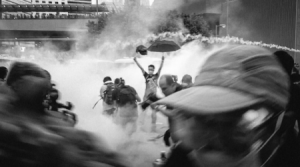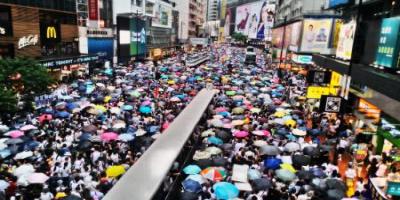Hong Kong's Youth Protests and US Position
Hong Kong's Youth Protests and US Position
 The recent youth protests expressed through civil disobedience, boycotting of classes, and blocking of government offices in Hong Kong have captured international public attention. These protests were dubbed "Occupy Central" (named after one of its organizing bodies) or the peaceful Umbrella Revolution. The expression of discontent through peaceful demonstrations is not unprecedented in the recent history of Hong Kong. Protests in 2003 in regards to the attempt of Hong Kong's Government to introduce national security legislation - Article 23 - can be called successful as they achieved the aim they intended. The unprecedented support for the unofficial referendum launched this summer by the Occupy Central movement for the universal suffrage in Hong Kong is not surprising, given the recent developments in the city’s political life.
The recent youth protests expressed through civil disobedience, boycotting of classes, and blocking of government offices in Hong Kong have captured international public attention. These protests were dubbed "Occupy Central" (named after one of its organizing bodies) or the peaceful Umbrella Revolution. The expression of discontent through peaceful demonstrations is not unprecedented in the recent history of Hong Kong. Protests in 2003 in regards to the attempt of Hong Kong's Government to introduce national security legislation - Article 23 - can be called successful as they achieved the aim they intended. The unprecedented support for the unofficial referendum launched this summer by the Occupy Central movement for the universal suffrage in Hong Kong is not surprising, given the recent developments in the city’s political life.
Understanding current events is easier if examining the history of Hong Kong. In 1997, Hong Kong became a Special Administrative Region (SAR) in the People’s Republic of China, administered by the Legislative Council and the Chief Executive who is elected by the Electoral Council comprised of 1,200 representatives from a broad range of permanent residents of the city. Hong Kong became a British colony after the first Opium War (1839-1842) when the Nanjing agreement was signed between China and Great Britain. The second agreement was signed in Beijing in 1898, when Great Britain, while extending Hong Kong’s territory to the main land, leased Hong Kong for 99 years, until June 30, 1997. Hong Kong was declared a Special Administrative Region (SAR) within China on July 1, 1997.
The major documents regulating current relations between the Hong Kong SAR and the central government in Beijing are: (1) "Sino-British Joint Declaration on the Question of Hong Kong"(1984) and (2) "Basic Law of the Hong Kong Special Administrative Region of the People’s Republic of China (PRC)."
Signatories of the agreements respected the statements declared in the documents and the promise from the Chinese Government that the “one country, two systems” approach would not be affected for fifty years, with eventual universal suffrage for the Chief Executive and the Legislative Council of Hong Kong. The electoral reform was scheduled to take place in 2007 for the Chief Executive, but the Legislative Council failed to manage the process or to pass the law. The electoral reform was postponed until 2017 (for the Legislative Council, and 2020 for the chief administrative body of Hong Kong).
The United States Government expressed its position in the 2007 Hong Kong Policy Act through the US Department of State – “The United States has strong interests in the protection of human rights and the promotion of democracy throughout the world. In Hong Kong, the United States is committed to promoting democratic values, facilitating the development of democratic institutions, and generally supporting the advancement toward universal suffrage in accordance with the wishes of the Hong Kong people.”
The Occupy Central movement began in response to the decision of PRC to screen candidates proposed by the Nominating Committee for the position of Chief Executive. The initial organizers of the movement were the Hong Kong Federation of Students, joined by Scholarism – a movement of secondary school students and Occupy Central with Love and Peace – founded by Benny Tai Yiu-ting, Associate Professor of Law at the University of Hong Kong. The similarity to the Occupy Wall Street movement is in name only. Occupy Central is a political movement and does not target capitalism or the increased income gap. The protesters' main demand is for the people of Hong Kong to have the choice to nominate their own candidates without screening by PRC. The second demand from the protesters is for the current Chief Executive to resign. The negotiations intended between the students and the Hong Kong Government were called off on October 6. It is not clear what will happen next, though as the Chief Executive has refused to resign. Currently, the demand of the protesters for him to step down is becoming even more vocal. The actions of the movement and its members' highly organized behavior (cleaning, organizing garbage, hotline for students for legal assistance in case of arrest, etc.) are reflective of the history of Hong Kong and the identity of its people formed under the influence of many factors. Hong Kong has been a part of British Empire for 150 years, has enjoyed economic prosperity and boom since the 1980s in particular, corresponding with the creation of political parties, and experienced a peaceful transformation into the Special Administrative Region under China.
The position of the U.S. Government, according to its Consulate General Statement (September 28, 2014) on the contemporary development of Occupy Central, is “consistent with the support for Hong Kong's well-established traditions and Basic Law protections of internationally recognized fundamental freedoms” and "the U.S. Government does not take side or supports any group or individual participating in the Occupy Central movement.” The U.S. Government called for dialogue: “We encourage all sides to refrain from actions that would further escalate tensions, to exercise restraint, and to express views on the SAR's political future in a peaceful manner." The US position regarding Hong Kong was again highlighted during the meeting of US Secretary of State, Kerry, and China’s Foreign Minster, Wang Yi on October 1, 2014 in Washington DC. Kerry expressed support for universal suffrage in accordance with the Basic Law, open society “with the highest possible degree of autonomy and governed by the rule of law.” The Foreign Minister framed the issue as an internal affair of China, and that Hong Kong authorities were capable of properly handling the situation in accordance with the law. The Government of China and administration of Hong Kong, are trying to contain the protests through peaceful means, and only limited incidents of violence when the police sprayed tear gas and pepper spray and an aggressive mob attacked some protesters, have been reported. The US position in Hong Kong for now, is calling for the respect of human rights and freedom simultaneously, and is not rushing to support or condemn either side. This is a sensible approach from the US, in particular on the eve of the upcoming meeting of US and Chinese Presidents in November when China hosts APEC Economic Leaders’ Week (Asia-Pacific Economic Cooperation) in Beijing chaired by the President Xi Jinping.
2014) on the contemporary development of Occupy Central, is “consistent with the support for Hong Kong's well-established traditions and Basic Law protections of internationally recognized fundamental freedoms” and "the U.S. Government does not take side or supports any group or individual participating in the Occupy Central movement.” The U.S. Government called for dialogue: “We encourage all sides to refrain from actions that would further escalate tensions, to exercise restraint, and to express views on the SAR's political future in a peaceful manner." The US position regarding Hong Kong was again highlighted during the meeting of US Secretary of State, Kerry, and China’s Foreign Minster, Wang Yi on October 1, 2014 in Washington DC. Kerry expressed support for universal suffrage in accordance with the Basic Law, open society “with the highest possible degree of autonomy and governed by the rule of law.” The Foreign Minister framed the issue as an internal affair of China, and that Hong Kong authorities were capable of properly handling the situation in accordance with the law. The Government of China and administration of Hong Kong, are trying to contain the protests through peaceful means, and only limited incidents of violence when the police sprayed tear gas and pepper spray and an aggressive mob attacked some protesters, have been reported. The US position in Hong Kong for now, is calling for the respect of human rights and freedom simultaneously, and is not rushing to support or condemn either side. This is a sensible approach from the US, in particular on the eve of the upcoming meeting of US and Chinese Presidents in November when China hosts APEC Economic Leaders’ Week (Asia-Pacific Economic Cooperation) in Beijing chaired by the President Xi Jinping.
### Photos courtesy of Flickr users Pasu Au Yeung (Police attacking demonstrators with tear gas) and Aaron Hui (Protest in Happy Valley, Hong Kong Island)




